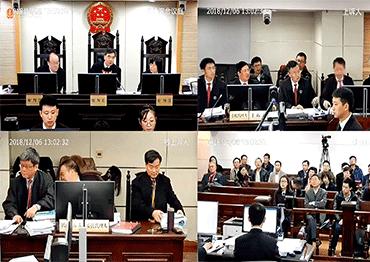Many private enterprises are established by entrepreneurs with strong personal characteristics in terms of corporate management, so detaining them beyond the legally prescribed time limits is likely to deal a lethal blow to these enterprises. Even when they are acquitted and set free, their firms are often left bankrupt.
Lawyer Chen Youxi has over the years experienced many cases in which entrepreneurs won the lawsuit, but by the time they had, their were no assets left to compensate them. He told our reporter that the leader of a high-profile enterprise in Nanjing, Jiangsu Province was in custody for three and a half years on suspicion of accounting fraud. After he was released, a debt chain of 70 billion yuan (US$10b) was due and two stocks fell by 50 percent before the enterprise was restructured.
Another plight facing private enterprises is the inability to pay up after a civil judgment is made. In the case of Muyang Group, even though Xu Ronghua reclaimed his equity, the corporate assets have largely evaporated. Muyang Group now exists in name only - the factory, facilities, employees and trademarks have all been transferred to another company.
“If the tangible and intangible assets, as well as the business relations of Muyang Group can’t be restored, the equity reclaimed by Xu Ronghua over the past 11 years will have little value,” said Chen Youxi. He added that if the assets and capital of Muyang Group could not be transferred back, the rights of Xu Ronghua and other shareholders are unable to be protected and winning the lawsuit is meaningless.
“It would set a very bad example,” he said. “Many more entrepreneurs will feel disappointed.”
“The SPP has proposed no arrests or charges whenever it is possible but there are to date no specific and detailed rules to implement it,” said Yao Guojian. He said that because China is so big, conditions are different and local judicial organs interpret the law in their own way.
Yao said the SPP should issue standard judicial interpretations of the regulations and release some cases that have been ruled on for local jurisdictions to use as a reference. “Basically, there should be a unified standard for local governments to implement.”
Yao added that infighting between shareholders and family members of an enterprise over corporate management and the division of profits is common, and sometimes criminal litigation is used to settle what are actually internal conflicts.
“It is the obligation of judicial organs to take action if there is a crime committed with adequate evidence,” he said. “Otherwise, judicial organs should try not to intervene in the internal disputes of an enterprise.”
In the opinion of lawyer Chen Youxi, it is of great significance if the SPP is instructing courts to avoid formal charges and encourage the use of probation for entrepreneurs to the greatest extent, but it should be pointed out that there are also many unjust judgments and wrongful convictions waiting to be redressed.
“The Chinese economy will only be healthy after the legitimate rights of private entrepreneurs are properly protected,” he said.

 Old Version
Old Version
